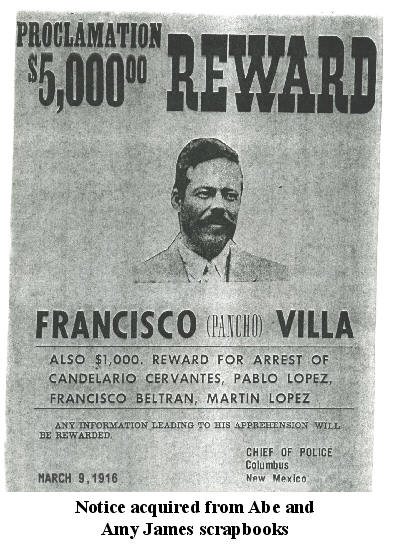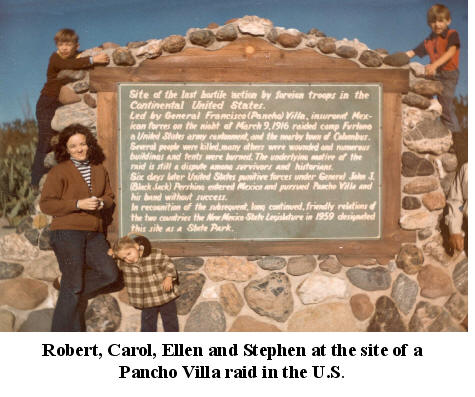Chapter 4 EXODUS
As time went on Provedio Dias, who had been President of Mexico
for about thirty years, was losing popularity with the people. A
fellow by the name of Blanco overthrew the Dias government. Then
his officers thought they ought to have more recognition in the
government and they started a revolution again, this revolution.
This stirred up quite a mess around the country, then Pancho
Villa got into it. The James' weren't bothered then, there
hadn't been anybody that had bothered us on the ranch up until
this time. The soldiers on either side didn't bother the
American people there, but it was just the little armies. A
bunch of men would get together, like a section gang working
together. They would decide it was too hard work to work on the
railroad anymore and now is the time to go up to the ranches and
demand horses and food from the ranchers. Then they'd organize a
little group and they'd start through the country from ranch to
ranch, getting food and new horses and saddles and guns from the
ranchers.
 But we hadn't been bothered in any way up until President Taft.
The trouble was getting so bad in the courts of Mexico that the
President of the United States ordered all the American people
that were in Mexico to leave Mexico and come out where they
could be protected in the United States. So they issued orders
for everybody to pack up and pull out.
But we hadn't been bothered in any way up until President Taft.
The trouble was getting so bad in the courts of Mexico that the
President of the United States ordered all the American people
that were in Mexico to leave Mexico and come out where they
could be protected in the United States. So they issued orders
for everybody to pack up and pull out.
Being on the ranch we were to join the people from Pacheco as
they came by. I remember meeting those wagons, we joined them
about five miles from Pacheco and about five miles from our
ranch. We met the wagon train and joined with them and started
on down to Dublan. We didn't go all the way to Dublan, we went
to the end of the railroad which was a logging camp at Pearson.
This was only about thirty miles from the ranch.
We hadn't even more than got all lined up on the road until we
met a bunch of federal soldiers, soldiers that were overthrowing
the Mexican government. They lined up on each side of the wagon
train and demanded a rifle from each family. Us kids were riding
in the back end of the wagon, but I can remember it like it was
yesterday. All lined up and these Mexicans all dolled up with
their strings of ammunition across each shoulder and around the
waist. Each of them had three belts of cartridges. As they came
by one of them would reach out and get the rifle and the other
man on the other side would reach out and get the ammunition. So
they had one kind of ammunition and the wrong kind of gun to use
it in. But they were all happy as long as they got a gun and
some ammunition and they didn't bother us any more.
We went on down to Pearson, Mother and the eight children at
home at that time. Mother was only allowed to take one trunk and
what she could put in suitcases on the train. We drove a team of
mules down to the train and I guess they're still there because
we drove up close to the train and unhitched the mules, put the
harnesses back on the wagon, turned the mules loose out on the
prairie there and got on the train. All the other people did the
same. Some of the menfolk stayed and took care, of some of the
stock for some of the colonies that were close by. But most of
the ranchers up in the mountains just turned their horses loose
for the time being and mounted the train and came out to E1
Paso.
 It was a long day's travel to El Paso. It seems we traveled for
maybe two or three hours and then they would cut the engine
loose and the engine would take off and leave us parked out
there in the middle of the desert, wondering whether the engine
was ever coming back or not. They had to go ahead and get some
more water for the engine and then they'd back up and hook on to
the train and then we'd start out again.
It was a long day's travel to El Paso. It seems we traveled for
maybe two or three hours and then they would cut the engine
loose and the engine would take off and leave us parked out
there in the middle of the desert, wondering whether the engine
was ever coming back or not. They had to go ahead and get some
more water for the engine and then they'd back up and hook on to
the train and then we'd start out again.
We couldn't have landed in a better place in the world than El
Paso. The way the people of El Paso treated the Mormon refugees
as they came out of Mexico, they met us at the train and hauled
people in their cars and their wagons out to any place they
could find to put them in. The majority of them wanted to live
together so there was an old lumberyard fixed up for
distributing lumber that we used. Each one of the stalls had
been cleaned out, the lumber had been sold but the stalls were
still there. They moved a family in each one of these stalls.
The city of El Paso furnished food and blankets until the army
could put up a tent city outside of El Paso and we moved out
there.
General Pershing, being young, was in charge of this camp at one
time. My sister, Sister Wallace Gurr, was expecting a baby about
the time we arrived in El Paso. A young lieutenant heard about
her being in one of the tents close to his so he went over and
had them move her into his tent until after the baby was born.
Come to find out it was General Pershing that took care of her.
When we were in El Paso it was July and August, which are very
hot months, but the people of El Paso were very good to the
Mormon people there and furnished them food. Then the army took
over and delivered food to us each day until we moved out and
were transferred into other parts of the United States.
Some families chose to stay in Mexico and others went back from
El Paso. One family that lived about three miles from Pacheco,
Brother and Sister Stevens, elected to stay in Mexico rather
than to come out with the rest of the people in Pacheco. Just a
few days after we arrived in El Paso the Stevens family arrived
and told us what had happened to their father and the reason
they were out to El Paso so soon after we got out when they had
elected to stay in Mexico. They said that the girls were out one
morning picking blackberries in the garden, which they had lots
of, and two Mexicans approached these girls to try to get
between the girls and the house, as the story was told. The
father, seeing these Mexican's intention, what he thought were
their intentions, of getting between the house and these girls,
whether they had that intention or not was never proven, but
anyway, the father went out with his shotgun to try to invite
these Mexicans to leave the ranch so they wouldn't bother these
young ladies. They slowly walked towards his boundary out
through the garden and orchard out to the fence. They walked
slower and he walked a little faster and he gained on them and,
I guess, carried on a conversation with them trying to get them
to leave the ranch. As they approached the gate near his
boundary line one of them whirled around with a knife in his
hand and stuck Brother Stevens through the chest with this
knife, mortally wounding him.
He shot one of them with the shotgun as he fell. The girls came
running up and, according to their story, one of the Mexicans
was running and they got the shotgun and shot him as he was
leaving. They didn't say whether they killed him or not but said
he was still lying there as they got help and got their father
back to the house. The boys were out hunting and the girls and
the father and mother were the only ones at the house at the
time with the smaller children. Immediately then, they got out
to the railroad and got out to El Paso and joined the rest of
the colonists out there.
Some of the Farnsworth’s also stayed. Some of the men folk
stayed at the ranch, but the rest of them came out. Then they
immediately went back into Mexico and gathered up cattle and
lived there.
Quite a few of the people went back to Mexico and gathered up
the cattle of the James' and others that had turned their cattle
loose. The men folk rounded up these cattle and drove some of
them out to Hachita, New Mexico and they were sold and the money
was distributed among the ones that helped drive them out.
Others rounded up cattle and stayed in Mexico and went into the
cattle business. They gathered stray cattle and cattle of their
own and did pretty well for several years.
We stayed in El Paso for about two months, July and August. Come
September the American government decided that things were so so
rough in Old Mexico that we couldn't return to the ranches but
they would furnish us transportation to any place in the United
States that we wanted to go. Mother's father and stepmother were
living in Ramah, New Mexico and the only thing she could do was
go where her father was. She didn't have or know of any other
place to go. So we went by train to Gallup, New Mexico and my
Uncle John Bloomfield, Mother's only brother, met us in Gallup
and moved us out. We lived with them until we got a house and
moved out and started family life, the boys taking care of
Mother and trying to find work around the Ramah area.
Some of the others went to Tucson, Arizona, and some of them
went to Provo, Utah. Aunt Liz went to Provo and Aunt Orpha had
died before this but the boys and her daughter went north, one
of them went to Snowflake and one of them went up to Idaho. From
then we've been separated and hardly know where each other
lives. The thirty-five children in Dad's family were soon
scattered all over the Southwest. We're still scattered around,
getting more of us all the time and getting farther apart as the
years go by and the older ones are passing on.